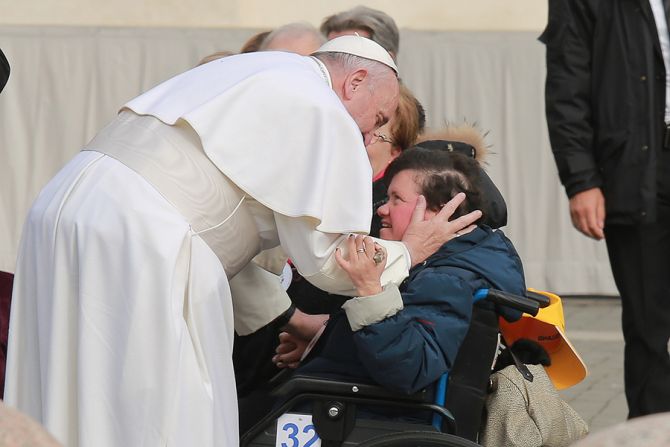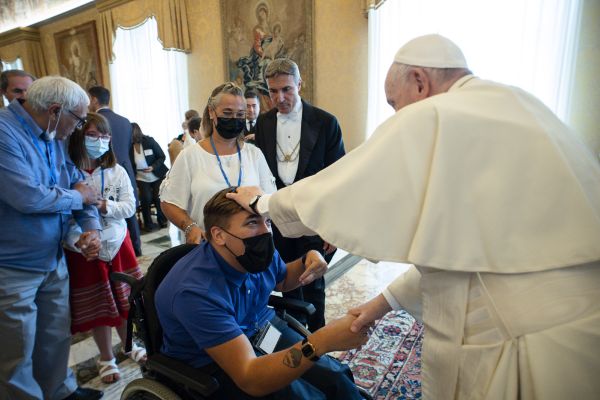
In his message for the International Day of Persons with Disabilities, Pope Francis said that the Catholic Church needs the participation of everyone, and the disabled must not be excluded from the sacraments.
“As we celebrate your International Day, I would like to speak directly to all of you who live with any condition of disability, to tell you that the Church loves you and needs each of you for the fulfillment of her mission at the service of the Gospel,” the pope said on Nov. 25.
The International Day of Persons with Disabilities will be celebrated on Dec. 3. Pope Francis’ message marking the day was released in print, as well as in video form with translations in American Sign Language and Italian Sign Language.
Quoting his 2013 exhortation Evangelii gaudium, he said: “The worst form of discrimination … is the lack of spiritual care.”
“Sometimes, as certain of you have unfortunately experienced, this has taken the form of denying access to the sacraments,” he said in his message.
“The Church’s magisterium is very clear in this area, and recently the Directory for Catechesis stated explicitly that ‘no one can deny the sacraments to persons with disabilities.’”
The theme of Pope Francis’ message for the day is friendship with Jesus, which he said is “an undeserved gift” that all have received and that can help those experiencing discrimination.
Friendship with Christ “redeems us and enables us to perceive differences as a treasure. For Jesus does not call us servants, women and men of lesser dignity, but friends: confidants worthy of knowing all that he has received from the Father,” he said.
Antonietta Pantone, 31, a Rome resident who uses a wheelchair, told journalists it was clear to her from the pope’s message that he considers it important that people with disabilities be part of the Church and not leave the Church.
She shared her personal journey of faith, which included finding a community in the Christian disability group Fede e Luce.
Fede e Luce is the Italian branch of the French association Foi et Lumière (known as Faith and Light in the English-speaking world), which began 50 years ago with a pilgrimage for people with disabilities to the Sanctuary of Our Lady of Lourdes in France. The movement has now expanded to five continents.
“I always say: In the eyes of God, we are all equal,” Pantone said, noting that in her journey of faith, friendship has been fundamental.
Friendship with others “demonstrates the closeness of God,” she said.
Pantone also explained how losing physical contact with friends because of the COVID-19 pandemic has been very hard for her and other disabled people, especially her friends who live in residences and not with family.

In his message, Pope Francis addressed the difficulty of the coronavirus outbreak for the disabled.
“I think, for example, of your being forced to stay at home for long periods of time; the difficulty experienced by many students with disabilities in accessing aids to distance learning; the lengthy interruption of social care services in a good number of countries; and many other hardships that you have had to face,” he wrote.
He mentioned in particular those who live in residential facilities, separated from loved ones. “In those places, the virus hit hard and, despite the dedication of caretakers, it has taken all too many lives,” he said.
He also emphasized the importance of confronting these challenges by finding consolation in prayer and friendship with Jesus.
“I would like to speak personally to each of you, and I ask that, if necessary, your family members or those closest to you read my words to you, or convey my appeal,” he said. “I ask you to pray. The Lord listens attentively to the prayers of those who trust in him.”
“Prayer is a mission, a mission accessible to everyone, and I would like to entrust that mission in a particular way to you. There is no one so frail that he or she cannot pray, worship the Lord, give glory to his holy Name, and intercede for the salvation of the world. In the sight of the Almighty, we come to realize that we are all equal,” he stressed.
Pope Francis also noted the continued presence of discrimination, ignorance, and prejudice at all levels of society, assuring people with disabilities that through baptism they are “a full-fledged member of the Church community, so that all of us, without exclusion or discrimination, can say: “I am Church!’”
“The Church is truly your home!” he said.
At a Nov. 25 press conference, Fr. Alexandre Awi Mello said that the Vatican’s Dicastery for Laity, Family, and Life is trying to do more to improve pastoral care for those with disabilities.
“This message, in recognizing that people with disabilities have their place in the holy faithful People of God, is a great invitation, for us in the dicastery, but above all for parish, diocesan and associative realities to take new paths with pastoral creativity,” Awi Mello said.
“It is a door that opens to think of pastoral care no longer for, but with…”
On Dec. 6, the dicastery will launch a video campaign with the hashtag #IamChurch. In five videos, Catholics with disabilities from different parts of the world will share about their experiences in the Church.
Pantone, who participated in one of the Vatican’s videos, told CNA that she would like to see the Catholic Church do more to develop courses that allow people with all kinds of disabilities to participate in parish life, such as formation courses to become a catechism teacher.
“I still had some ways to study [to become a catechist],” she said, “but it depends on the type of disability, so if another disabled person wants to be a catechist, the Church should give him all the appropriate tools.”
Pantone said that the Church can do a lot for the disabled, but the recently begun Synodal Journey “is already a step forward which the world of disability sees positively.”
Pope Francis said in his message that “having Jesus as a friend is an immense consolation. It can turn each of us into a grateful and joyful disciple, one capable of showing that our frailties are no obstacle to living and proclaiming the Gospel.”
“In fact, a trusting and personal friendship with Jesus can serve as the spiritual key to accepting the limitations that all of us have, and thus to be at peace with them,” he said.
Source: Licas Philippines
0 Comments